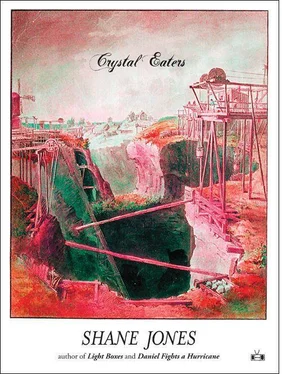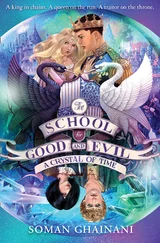They total seven men dressed in khaki pants and powder-blue shirts. Z. is the exception. He wears black pants and a cream-colored button down. A dogtooth-shaped whistle on a string dangles around his neck. Green fabric torn from his grandfather’s robe is tied around his left wrist.
“This is it,” he says. “No turning back now.”
Ricky moves the knife. With the help of Bobby T. they open the fence.
They stand at the bottom of the cliff. At the top is The Bend. Before they climb, everyone but Z. removes handcuffs from their pockets. Z. locks their wrists behind their backs. All eyes sting with sweat.
The sun boils clouds.
The sky bleached.
They follow Z. up the cliff. They fall and slide and claw and become covered in dirt, just how they planned. They climb with their heads down, blinking from the raining dirt. Ricky is a bit dramatic and falls several times on purpose, flopping back down the cliff with his legs outstretched. Dirt fills their shoes and dirt pours down their backs and dirt becomes stuck in their sweat. They find levels of harder dirt they use as stairs and they climb to the top. A few city gawkers holding binoculars step back and mumble. A young girl holds a phone into the sky and moves her thumb up and down against the screen. A man with a face like a horse says they look funny. He tries to say more but chokes on the candy he’s eating. His wife slaps his back and he walks away, head down, one arm raised, swallowing.
They walk in a single file line with Z. leading and the sun following. After a half mile through the outskirts of the city, the Brothers looking into the streets and seeing things like dogs dressed in leather jackets, big suits on little men, hairy neck = gold chain, twenty types of bottled water, electronic shirts, traffic lights somersaulting green-yellow-red, neon signs, everything electric and somehow not powered by yellow crystals, everything big and ugly and loud, the intricate brickwork of the prison comes into focus.
“Everyone okay?” says Z.
If there was a problem someone would speak because the plan said so.
Z. walks painfully tall. He tells himself that he’s in control because he’s the kind of person who is never in control. He doesn’t perspire much, but the heat pulsates against his ears. His heart beats scary fast so he relaxes with conscious rhythmic breathing (Pants wrote that city people do yoga and detailed something called Prana). He tells himself everything will be okay. The jailbreak in reverse will be his greatest accomplishment because it has to be.
“Good,” he says. “Let’s go.”
They prepare their facial expressions as they reach the prison.
A glass booth shouldered by gates and barbed wire is the first encounter. Behind the gates and glass booth is a paved road to the prison entrance. There’s a door, ADMINISTRATION, with two guards standing at either side. The guards are dressed like the guard inside the glass booth Z. makes eye contact with — perfectly pressed blue pants and crisp tucked-in blue shirts.
A drain in the glass booth, face level, holds a metal net that distorts his voice when he speaks into it, “Good morning. Reporting.”
“What?” says the guard, a short man with blue eyes, head shaved and wrinkled with fat. There’s a motorized fan clipped in the corner of the booth on full blast. It appears to do little to cool. He’s the sweatiest person Z. has ever seen.
“Reporting,” he repeats, the last few letters, the “ing,” an embarrassing high pitch, Z. not totally positive if what he was told to say by Pants is right.
“Reporting?” says the guard who draws his gun from the holster. “Reporting what?”
Z. wonders if what he was told, what he remembered from the letters, has become scrambled in his head and he’s getting it all wrong. But that’s impossible. He’s spent endless hours memorizing the plan nailed to his bedroom wall, highlighted with red pen.
“Exchange inmates from Willows Bay,” he says looking at the Brothers. “Standard set here. Shouldn’t take long. You believe this heat? The sun. Heck, I remember when I’d stand at The Bend and watch the turquoise sky and don’t think we’ll ever see that again. Nah, all different now.”
“Right,” says the guard.
His gun is halfway drawn. Z. looks like the typical transfer guard with necklace whistle and cream-colored shirt. There’s a weird piece of green fabric at his wrist but that’s nothing too strange because transfer guards are an odd bunch and there’s such a high turnaround for the job. And the exchange inmates all have the facial expressions of men with nothing to do but think about what they are recently found guilty of. The guard studies them. Nods Z. up and down.
“They say we’re not coming?” says Z. “Typical.”
“I get mad,” says the guard.
The Brothers, minus Z., take turns looking at the sky, their boots, everyone making tough-guy faces.
Just trust and follow the plan — Pants .
Inside the glass booth is a computer. The guard’s fingers graze the letters QWERTY, his eyes narrowed and mean at Z. before he slaps the gun back into his holster. The noise makes Z. flinch and prepare to absorb a bullet. Then the guard says, “Ah, I’m messing with YOU. You need a blood transfusion? Look white. GOT YOU. Got you real good. Oh man did I get you good.”
“R-r-r-reporting,” repeats Z. This was never mentioned. “I’m just… reporting like I’m s-s-s-supposed to. Reporting.”
The guard bounces inside the booth drum-slapping the walls. Then he starts patting his pockets. He’s incredibly short — his height barely increases when he stands from the swivel stool and Z. notices a rectangular clip on his breast pocket engraved with his name, Karl.
“I do this all the time, newbie,” says Karl. “Getting people is what I do.” With a pen he pulls from his pants pocket he writes a single | in a notebook filled with pages of |.
Z.’s shoulders drop. He remembers his breathing. The air is disgusting. He composes himself back into character, remembers something Pants said in a previous letter and he laughs, shakes his head, slaps the glass twice and says, “Fucker, you did. Now open up before these boys die of heat stroke.”
“Heat wave gonna kill us all,” says Karl jingling a ring of keys. “But nobody wants to listen to me. Man, did I get you guys. Might be the best get I’ve ever gotten. Hold on.”
Z. and the handcuffed Brothers mingling behind him stay on script. Some stand looking at their feet hiding their smiles, others are puffed-chest and tight-jawed. Ricky, on the verge of fake crying, rubs the side of his face against his shoulder. Karl comes out of his booth and a buzzer goes off. He nods at Ricky and says to Z., “Always one in the bunch, huh.”
“Yeah,” says Z. “It’s the guys who can shut themselves off who survive.”
“You know the drill,” says Karl.
The notes, the guidelines, the advice from the letters, are working. Even Z. is kind of surprised when they get access into the prison. Bobby T. smiles as the gates open to ringing bells and then he stops smiling when Z. gives him a real mean look. The bells sound like the days of worship when the mine workers announced green and red crystal finds. Bobby T. was a child running to the mine with dozens of kids, pushing and swerving around each other, never tripping. He held a big green one up to the sun and it looked like water.
The wind blows their shirts into fat suits. Bobby T., as instructed to do at various times, spits, and the saliva wraps around his cheek. He attempts to slap the spit from his beard but forgets the handcuffs and the hot metal digs into his wrists. He rolls a shoulder and the saliva comes off on his shirt in a solid leash.
Читать дальше











